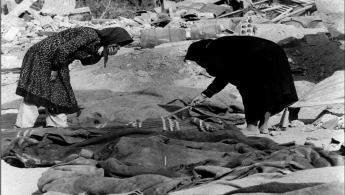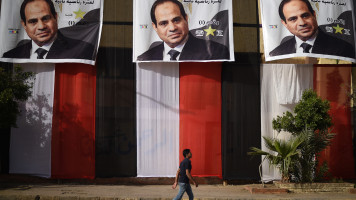'Bloodthirsty wolves': Remembering the Sabra and Shatila massacres
'Bloodthirsty wolves': Remembering the Sabra and Shatila massacres
Lebanese, Palestinian and Christian survivors speak to The New Arab about their memories of the horrific Sabra and Shatila massacres during Lebanon's Civil War.
4 min read
Survivors remember the horrific massacre, as perpetrators have not been brought to justice [Getty]
The last 34 years have not erased the memories of the survivors of the Sabra and Shatila massacres.
Although time has passed, when the anniversary arrives each year on 16 September many survivors remember the massacre like it was yesterday.
They march from Shatila camp to the cemetery, crying and demanding justice for the massacre in 1982, by Christian far-right militants and their Israeli watchmen.
Ahmed, one of the survivors of the massacre told The New Arab that at 5pm the Lebanese Phalange militia entered Sabra camp, as Israeli soldiers surrounded the area and provided cover.
"The people were in their homes and the camp was free of arms. Around 400 armed men came in, abusing children, women and elders. They were like a flock of bloodthirsty wolves," he said.
"The first of the their victims were forty members of the Miqdad family (of Lebanon).
Knives and machetes
The men carried knives, machetes and other sharp objects, and he turned his eyes away from the cemetery pointing at the camp.
"I was fourteen years old. There was a group of us joining the resistance in the area, throwing stones. But once we saw what they had done to two of the boys, I ran through the alleyways until I reached Madina Riyadiah," he said.
Aside from the tools that carried out the massacre, the killers resorted to abusing the bodies. Some of the bodies were found cut and burned.
The massacre was carried out away from the eyes of the world. But it was within site of the Kuwaiti embassy as Israeli soldiers lit flares to aid the Lebanese militias.
There are no accurate statistics for the number of victims but they are estimated to be between 750 and 4,000 Palestinians and Lebanese killed.
According to testimonies, the majority of the victims were Lebanese.
The camp's residents were trapped in their homes and shelters when the attacks happened, unaware of the plan to murder them. Children slept and never woke up, women were raped and murdered, and the elderly were burned to death.
"I was at home with my baby. My son and husband were out as my daughter recently got married. I heard screams, moans and the sound of bombs," said Um Ali, a Lebanese survivor.
"I hid my [baby] daughter under the mattress. At nine, I heard less noise but didn't come out. In the morning everything calmed down. I saw bodies, cut and burned."
"I started praying that I wouldn't see my family among the victims, and returned to the house. After hours I gathered my strength and trust in God and went out, but I was not expecting the horror of the scene - my daughter, her face burned.... and bodies mutilated."
Christian victims
Malanah Botros is a Christian survivor lost her husband and three children in the massacre.
"We heard the sound of bombs. I decided to go with my children to the shelter, and when we were out of the house saw five men carrying knives dripping with blood. I said in the name of the cross, I am a Lebanese-Christian from the house of Botros. They took us to Ashrafiah in east Beirut where we heard one of the [militants] saying if anyone wants to take revenge on Palestine come to us," she said.
"I said that Jesus was Palestinian, and everyone has made mistakes in the war. They said if Jesus is in the camp, they will kill him."
She returned to the camp to find one of her sons beheaded, and another one killed and mutilated, and her husband's dead body strung up.
A few hundred metres away in the refugee camps of Sabra and Shatila, residents of Burj al-Barajneh were oblivious to what was going on"
"That night we could hear only the voice of flares, we never felt that a crime was occuring, as the night was taking innocent lives quietly and tranquily," said camp resident Fadia Lubani.
Forty-eight hours passed without a word coming out of what was happening. The press were barred from entering the camp, but the smell of decomposing bodies showed signs of the crime.
"Entire families were buried and the people who come to remember their loved ones weep at the graves. Others have asked about their family members, if they are buried among the dead, but I couldn’t give a response," said Adnan al-Miqdad, a guard for the cemetery.
Since the massacre, there has been no substantial judicial investigation, and the perpetrators remain free men.
Until then the families of the Palestinian and Lebanese victims await justice, united in their pain.
Imogen Lambert contributed to this report
Although time has passed, when the anniversary arrives each year on 16 September many survivors remember the massacre like it was yesterday.
They march from Shatila camp to the cemetery, crying and demanding justice for the massacre in 1982, by Christian far-right militants and their Israeli watchmen.
Ahmed, one of the survivors of the massacre told The New Arab that at 5pm the Lebanese Phalange militia entered Sabra camp, as Israeli soldiers surrounded the area and provided cover.
"The people were in their homes and the camp was free of arms. Around 400 armed men came in, abusing children, women and elders. They were like a flock of bloodthirsty wolves," he said.
"The first of the their victims were forty members of the Miqdad family (of Lebanon).
Knives and machetes
The men carried knives, machetes and other sharp objects, and he turned his eyes away from the cemetery pointing at the camp.
"I was fourteen years old. There was a group of us joining the resistance in the area, throwing stones. But once we saw what they had done to two of the boys, I ran through the alleyways until I reached Madina Riyadiah," he said.
Aside from the tools that carried out the massacre, the killers resorted to abusing the bodies. Some of the bodies were found cut and burned.
The massacre was carried out away from the eyes of the world. But it was within site of the Kuwaiti embassy as Israeli soldiers lit flares to aid the Lebanese militias.
There are no accurate statistics for the number of victims but they are estimated to be between 750 and 4,000 Palestinians and Lebanese killed.
According to testimonies, the majority of the victims were Lebanese.
The camp's residents were trapped in their homes and shelters when the attacks happened, unaware of the plan to murder them. Children slept and never woke up, women were raped and murdered, and the elderly were burned to death.
 |
I said that Jesus was Palestinian, and everyone has made mistakes in the war. They said if Jesus is in the camp, they will kill him. |  |
"I was at home with my baby. My son and husband were out as my daughter recently got married. I heard screams, moans and the sound of bombs," said Um Ali, a Lebanese survivor.
"I hid my [baby] daughter under the mattress. At nine, I heard less noise but didn't come out. In the morning everything calmed down. I saw bodies, cut and burned."
"I started praying that I wouldn't see my family among the victims, and returned to the house. After hours I gathered my strength and trust in God and went out, but I was not expecting the horror of the scene - my daughter, her face burned.... and bodies mutilated."
Christian victims
Malanah Botros is a Christian survivor lost her husband and three children in the massacre.
"We heard the sound of bombs. I decided to go with my children to the shelter, and when we were out of the house saw five men carrying knives dripping with blood. I said in the name of the cross, I am a Lebanese-Christian from the house of Botros. They took us to Ashrafiah in east Beirut where we heard one of the [militants] saying if anyone wants to take revenge on Palestine come to us," she said.
"I said that Jesus was Palestinian, and everyone has made mistakes in the war. They said if Jesus is in the camp, they will kill him."
She returned to the camp to find one of her sons beheaded, and another one killed and mutilated, and her husband's dead body strung up.
A few hundred metres away in the refugee camps of Sabra and Shatila, residents of Burj al-Barajneh were oblivious to what was going on"
"That night we could hear only the voice of flares, we never felt that a crime was occuring, as the night was taking innocent lives quietly and tranquily," said camp resident Fadia Lubani.
Forty-eight hours passed without a word coming out of what was happening. The press were barred from entering the camp, but the smell of decomposing bodies showed signs of the crime.
"Entire families were buried and the people who come to remember their loved ones weep at the graves. Others have asked about their family members, if they are buried among the dead, but I couldn’t give a response," said Adnan al-Miqdad, a guard for the cemetery.
Since the massacre, there has been no substantial judicial investigation, and the perpetrators remain free men.
Until then the families of the Palestinian and Lebanese victims await justice, united in their pain.
Imogen Lambert contributed to this report



